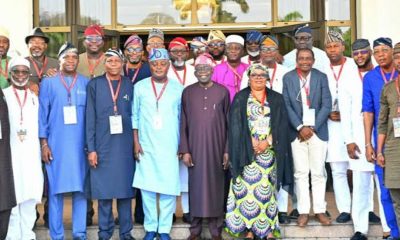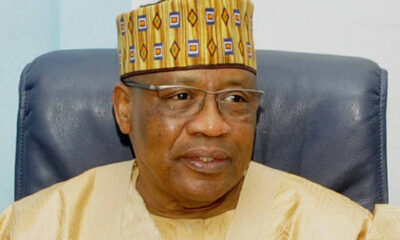Business
Nigeria May Slip Into Recession as Budget Deficit Hits N30.58trn In Seven Years

The budget deficit has risen to at least N30.58tn in the last seven years.
This is according to data from budget implementation reports for the third and fourth quarters of 2015; the four quarters of 2016, 2017, 2018, 2019, 2020; the first three quarters of 2021; and the first four months of 2022.
According to Investopedia, a budget deficit occurs when expenses exceed revenue.
An analysis of the reports on the Budget Office of Nigeria’s website revealed that Buhari’s administration had spent at least N54.98tn on budget implementation since its inception but has only financed this spending with N24.39tn, leaving a deficit of N30.58tn.
A breakdown of some of the expenses revealed that the present administration had spent at least N23.66tn on personnel costs, pensions, overhead costs, presidential amnesty programme, other service-wide votes, and special interventions.
A minimum of N14.13tn has been spent servicing domestic and foreign debts, and at least N10.47tn has been spent on capital expenditure.
According to the reports, this deficit financing has been largely financed by government borrowing. The budget implementation report for Q4, 2015 said, “The FGN has arranged to raise short-term credit from the CBN through the mechanism of Ways and Means subject to a ceiling of 12.5 percent of FGN’s revenue.
“This amount will be retired and therefore not considered as new borrowing outside the borrowing approved to finance the budget deficit. However, due to current fiscal challenges, the CBN had agreed to increase the Ways and Means advances threshold hence the FGN’s ability to raise N615.96bn from this source.”
Since allowance for raising the ceiling was made, total borrowing from the CBN has hit N19.01tn in April 2022 from N648.26bn as of June 2015.
READ ALSO:
- APC chieftain’s house set ablaze in Benue
- Youth pastor, father remanded for illegal banking
- NBA to petition NJC over imprisonment of human rights lawyer
Also, the nation’s total debt profile hit N41.06tn as of March 2022 from N12.12tn, according to the Debt Management Office.
A document titled ‘Public Consultation on the Draft 2023 – 2025 MTFF/FSP’ presented by the Minister of Finance, Budget & National Planning, Mrs. Zainab Ahmed, said, “Revenue generation remains the major fiscal constraint of the federation. The systemic resource mobilization problem has been compounded by recent economic recessions.”
Recently, the Monetary Policy Committee of the Central Bank of Nigeria raised concerns over the nation’s debt sustainability. It said the Federal Government’s debt profile was worrying and noted that there was a need for it to urgently diversify its revenue base.
Commenting on the story, economists stated that a high deficit was not good for the economy and might cause inflation, recession, and slow down growth.
Speaking to a reporter, an economic expert, and seasoned academic at the University of Uyo, Professor Akpan Ekpo, said, “This shows that expenditure has eclipsed the revenue, because they have to borrow, which is why there is a deficit.
“They can’t raise enough domestic resources to finance spending. That gap is a deficit. Talking about GDP, by the rules, it should not be more than a certain percentage of GDP, but it has exceeded that. And when you borrow, you have expectations of borrowing because if you are not transparent, we don’t know what you are borrowing for.
“If you are borrowing to finance recurrent and overhead, it is not good for the economy. If you borrow to finance capital projects, in the long run, even if you have a deficit, it will have a positive multiplier effect. The deficit, if it is used to finance recurrent, is problematic to the economy.
READ ALSO:
- IGP meets strategic police managers, orders crime mapping
- Gunmen kill abducted LAUTECH student, hotelier after N5m ransom
- Arise TV anchor apologises for driving in BRT lane
“One way of solving that is to raise more of domestic revenue or cut down on expenditure that is not needed, especially, the cost of governance. There is a need to check the expenditure profile and cut down on it. Or we could do expenditure switching, where unimportant items are switched with important items.
“We are spending more than we can raise resources and we are not spending it on hard infrastructure.”
Associate professor of Economics at the Pan-Atlantic University, Lagos, Olalekan Aworinde, added that the deficit was being financed by either government borrowing, sales of government properties, or printing money.
According to him, any of these options had implications for the economy. He stated, “Loans can be good and can be bad. A loan is good if it is used for productive expenditure, but if it is used for recurrent expenditure or consumption expenditure, this is not bringing back any returns.
“If the component of this deficit is majorly recurrent expenditures, it shows that we are unlikely to have any growth. There isn’t going to be any revenue coming out from there. The implication of this is that we are likely going to have stunted growth. Stunted growth in the sense that we are not likely going to have an increase in the total values of goods and services that are produced in the country.
“If care is not taken, we are likely going to slide into recession.”
He added that financing the deficit through sales of government properties would mean the government was reducing its asset base, which did not speak well for the economy.
NPO
Business
Naira strengthens, gains N29.89 against US dollar

Naira strengthens, gains N29.89 against US dollar
The Nigerian Naira closed the week on a positive note, appreciating by N29.89 against the US Dollar in the official market.
According to data from the Central Bank of Nigeria (CBN), the Naira traded at N1,517.93 per dollar on Friday, reflecting a 1.9% increase from Thursday’s closing rate of N1,547.82.
READ ALSO:
- EL-Rufai, police clash over ex-commissioner’s arrest
- How to lower fuel consumption of your car
- South African ambassador ‘no longer welcome’ in US, Rubio says
The currency’s recovery comes after a period of decline since March 5, offering a sign of relative stability. In recent months, the Naira has traded within a range of N1,500 to N1,900 against the dollar across both official and parallel markets.
This uptick suggests ongoing efforts to stabilize the currency may be yielding results, as market watchers remain hopeful for sustained improvements.
Naira strengthens, gains N29.89 against US dollar
Auto
How to lower fuel consumption of your car

How to lower fuel consumption of your car
When President Bola Tinubu announced an end to fuel subsidy at the inception of his regime in 2023, many motorists were jolted by the expected impact it would have on the cost of keeping their vehicles on the road.
Many Nigerians were also concerned about the impact it would have on the cost of living, especially the prices of goods, services and transportation.
And their fears were genuine; prices of goods went up astronomically and there were complaints of hardship all over the country.
This led to a swift drop on the sales of big cars, especially Sport Utility Vehicles. Many Nigerians quickly parked these cars in their homes and some immediately put up theirs for sale while others quickly bought smaller cars that they presumed would consume less fuel. They forgot that the rainy season would not be fair to the roads and their new small sedans, especially the bumpers and underneath the cars.
Those living in flood-prone areas like Lekki and some seasonally flooded areas in Rivers, Delta and Bayelsa states can attest to the advantages of SUVs over sedans from their expenses. With some of these expected challenges, it didn’t take long for the average Nigerian motorist to adjust and live with the negative impacts of the fuel subsidy removal.
Though the challenge persists, coupled with the poor state of the roads across the country, it has been almost impossible for Nigerians to totally do away with their big cars and SUVs which are renowned for higher fuel consumption. It is the classical case of choosing between the devil and the deep blue sea.
READ ALSO:
- South African ambassador ‘no longer welcome’ in US, Rubio says
- Nasir El-Rufai’s scorched-earth one-man opposition, By Farooq Kperogi
- Osimhen scores hat-trick as Galatasaray demolish Antalyaspor
Today, Vanguard offers you some tips on how to ensure maximum fuel economy in your vehicles at a time like this. It is clear that by improving your car’s fuel economy, you’re helping to reduce the drain on your wallet. With some simple driving tips and habits, your fuel can take you further. A combination of good driving habits, and proper vehicle maintenance of your car is essential.
The Tips
*When driving, accelerate and brake gently, quick starts and stops waste fuel, but smooth driving boosts your kilometres per litre. Driving at slower speeds leads to better fuel efficiency.
Reducing speed by 10-20 kph can help. Keep a steady speed, you may use your cruise control on motorways because when you drive at a consistent speed, you save fuel.
•Watch the traffic ahead, it will help you predict what other drivers will do or intend to do. This helps you to avoid braking and speeding up.
•Also avoid idling your engine for long periods even when it is stationary as it wastes fuel. Switch off the engine if you need to stop for more than a minute.
•Also limit short journeys, and be aware that cold starts use more fuel.
•As a motorist, ensure that your tyres are appropriately gauged. Soft tyres cause drag and waste fuel. Check pressures often and inflate correctly.
Many drivers don’t know that proper inflation of their car tyres contributes significantly to the fuel economy. Under inflated tyres have a higher rolling resistance on the road. This means that your tyres generate more friction and rolling resistance and will increase fuel consumption.
READ ALSO:
- My wife is a pastor, can’t be Bigot, Tinubu tells Catholic bishops
- Electricity: TCN blocks access to data from DisCos
- Customs seize 1,149 jerry cans of petrol in Taraba
If your four tyres are underinflated by 10 psi, this could increase your fuel consumption by 10 per cent. Car manufactures always have the recommended tyre gauge inscribed on the drivers door frame. Gauge your tyre accordingly and reduce your fuel consumption.
•Correct wheel alignment is vital. It reduces tyre wear and drag. This also saves fuel.
•Many motorists carry all sorts of things in their boots which they hardly need and this adds to the weight of the car, this should be avoided. Note that every extra 50kg of load in your car increases fuel consumption by about two to three percent.
Some used cars from abroad come with a heavy bar attached to the rear for pulling boats and other heavy objects from where they have been imported which is hardly needed in this part of the world. It is advised that you remove them to avoid unnecessary weight.
Some people however believe that this serves as protection when another vehicle hits them from behind, unknown to them that they are paying more to fuel their cars. Lighten your load and remove extra weight from the car. Less weight means better fuel economy.
•Also, reduce drag by removing roof racks as they increase wind resistance which wastes fuel.
•Use your air-conditioning system. Driving with an air-conditioner has an advantage to fuel economy but most drivers think otherwise.
Apart from keeping the interior of your car clear of dust and ensuring the safety of the driver from attacks, it also saves fuel. Driving with windows down at a speed faster than 80km/h causes a lot of wind resistance and more fuel consumption. It is more fuel efficient to drive with your air-conditioner on.
•Maintain the right speed. Avoid over speeding and going slowly too.
While both have safety consequences, they also have an impact on your fuel consumption. It has been established that on highways, your engine works hard to overcome wind resistance.
This means that you will burn up to 15 per cent more fuel at 100km/h and 25 per cent more at 110km/h. On the other way round, if you drive at a speed slower than 50km/h your engine would drop to a lower gear thus using up more fuel. It is advised that driving between 50km/h and 90km/h gives optimal fuel efficiency.
•Many people accelerate their cars as if they are running at Formula 1 Race thereby wasting their fuel unknowingly. Avoid revving your accelerator to a high revolution per minute (RPM). Your engine uses less fuel when it is revolving slower at a lower RPM.
•It is also important to note that aggressive braking is not only a disadvantage to the brake pad but increases fuel consumption.
Slamming on the brakes increases fuel consumption as the car needs to accelerate again. Give a reasonable distance between you and the vehicle in front of you. If you have been driven by a pilot before, you would understand what it means to drive with caution.
READ ALSO:
- 10 ex-Buhari’s ministers to dump APC for SDP
- FG refutes US Congress claim of terrorists targeting Nigeria’s Christians
- Jimoh Ibrahim speaks on Senator Natasha’s petition to IPU
They are very cautious of the vehicles in front of them and avoid them from afar. I am sure that if we take count of professionals who hardly get involved in traffic accidents, the pilot would take the number spot.
•Avoid hard acceleration when moving your car from complete stop or climbing hills as it increases fuel consumption. Most people who drive vehicles with automatic transmission hardly know the advantage of one special feature in the car called cruise control.
If you are driving an automatic car, you can make use of cruise control to keep your speed constant. But if you are driving a manual car, maintain a higher gear when appropriate. This ensures that your engine goes through less revolutions per minute, RPM and ensures less fuel consumption.
•Driving in traffic causes higher fuel consumption. Stop-start traffic puts a lot of pressure on your engine and burns more fuel. Avoid peak traffic if possible. Turn off your engine when it is parked. As long as your engine is on, the fuel is burning. The choice is yours to keep the engine steaming when that car is not moving. It is your fuel that is burning which you can use to cover some kilometers.
•Regular servicing with quality engine oil is key to the longevity of your engine. If your engine is poorly maintained, it will lead to sludge and corrosion build-up which will prevent the engine from working smoothly. Regular maintenance is key.
•Follow your vehicle’s schedule, a healthy engine works better. A clean air filter lets the engine breathe freely. Good airflow improves fuel use. Use the right oil type to reduce friction and boost engine performance. When buying a new car, think about fuel efficiency. Pick a model that fits your needs. If your car has a fuel-saving mode, then use it.
How to lower fuel consumption of your car
Vanguard
Business
Electricity: TCN blocks access to data from DisCos

Electricity: TCN blocks access to data from DisCos
Different interest groups in the Nigerian Electricity Supply Industry (NESI) yesterday raised the alarm as the Independent System Operator (ISO) of the Transmission Company of Nigeria (TCN) blocked access to distribution companies (DisCos) daily load profile on its website.
The section of the website has been inaccessible for over a month with no one offering explanation.
Meanwhile, the Transmission Company of Nigeria (TCN), spokesperson, Ndidi Mbah did not answer calls to her mobile line. She also refused to respond to the WhatsApp message sent to her for inquiry.
Responding to the situation, Sage Consulting, Lead Power Sector Analyst, Mr. Bode Fadipe said the fact that the TCN barred access to the DisCos load profile for this long raises the question if it has something to conceal from the stakeholders.
READ ALSO:
- Customs seize 1,149 jerry cans of petrol in Taraba
- 10 ex-Buhari’s ministers to dump APC for SDP
- FG refutes US Congress claim of terrorists targeting Nigeria’s Christians
He described the website’s daily load profile as the tool with which customers and other members of the public can assess the performance of the energy distributors.
Fadipe stressed that platform should be a validation measure for holding the DisCos accountable.
He said allowing the DisCos to operate without access to the load profile could aid them to reject load.
His words: “If other information is accessible on that platform and it is not a technical issue what could be responsible for that? Do they have anything to hide?
” If they have resorted to that, we call for greater transparency so that it can help us to see performance. I think it is not a very good sign because the power sector is supposed to be a transparent industry where people can pick up information and the public can monitor all the time and be able to hold DisCos responsible.”
Electricity: TCN blocks access to data from DisCos
-

 metro1 day ago
metro1 day agoBREAKING: Appeal Court stops Sanusi’s reinstatement as Kano emir
-

 Entertainment3 days ago
Entertainment3 days agoCourt bans viewing of controversial film, ‘Gang of Lagos’
-

 Politics2 days ago
Politics2 days ago2027: Southern Kaduna group rejects El-Rufai, supports Tinubu
-

 News3 days ago
News3 days agoNigerian woman declared dead appears in UK court to reclaim her £350,000 home
-

 Opinion13 hours ago
Opinion13 hours agoNasir El-Rufai’s scorched-earth one-man opposition, By Farooq Kperogi
-

 Auto2 days ago
Auto2 days agoThree electric vehicles on display steal show at Lagos Motor Fair
-

 metro3 days ago
metro3 days agoTinubu backs Obasa to remain Lagos speaker, ends assembly crisis
-

 News3 days ago
News3 days agoNatasha: Senate writes IPU on her suspension













